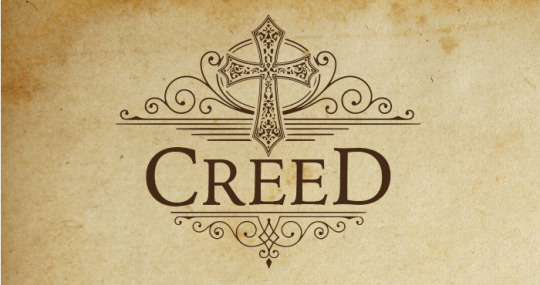#kyrios iesous
Photo

The earliest Christian creedal statement was most likely the simple yet profound New Testament proclamation, “Jesus is Lord! Saying “Jesus is Lord” (Greek: Kyrios Iesous) was the New Testament equivalent of saying, “Jesus is Yahweh” (the Lord God). This declaration of Jesus’ Lordship as the Messiah and Savior set first-century Christians apart both from Judaism and from the Romans’ worship of Caesar. Acknowledging Jesus as Lord lies at the heart of the Christian faith...
For Protestants, the authority of the creeds is not intrinsic but rather derived from Scripture. According to the Protestant principle of ‘sola Scriptura’ even creeds are subject to the supreme authority—the written Word of God. While creeds provide a valuable summary of universal Christian beliefs, they are not divinely inspired… Creeds are at least conceivably open to correction, reform, or modification, but always in light of Scripture...
The Apostles Creed, Nicene Creed, and Athanasian Creed identify the three divine Persons of the Trinity (Father, Son, and the Holy Spirit), focusing on their unique roles in redemption… Because too many Christian churches today fail to focus adequately on the full triune nature of God, many Christians live as functional Unitarians… The creeds which reflect a balanced trinitarianism can serve as a helpful corrective to today’s theological imbalances and lack of theological training...
The church fathers formulated the Nicene Creed in large part to address the Arian heresy that denied the unqualified deity of Jesus Christ by making him a creature. Arianism is still seen today in the theology of Jehovah’s Witnesses, Christadelphiams, and Iglesia ni Cristo...
The Athanasian Creed sets forth the Christian doctrine of the Trinity (three in unity), rejecting both polytheism (the belief in more than one god) and modalism (belief that the one God merely changes modes of expression). Polytheism is evident today in Mormonism, and modalism lives on in the United Pentecostal Church (Jesus only)...
The Creed of Chalcedon set forth the normative theological standard concerning the two natures of Jesus Christ (divine and human), thus rejecting various christological heresies (such as Monophysitism, the doctrine that there is only one nature in Christ, a belief still held by the Coptic Church)...
A creed is not, and was never meant to be, a substitute for personal faith. It attempts to give substance to a personal faith that already exists. You do not become a Christian by reciting a creed. Rather the creed provides a useful summary of the main points of your faith...
Contrary to the message too often heard in churches today, doctrine and theology are critical to an individual's spiritual growth and can provide a much-needed biblical foundation to stand on...
~ Kenneth R. Samples; Alister E. McGrath
#kyrios iesous#lds#jws#iglesia ni cristo#modalism#polytheism#christadelphian#monophysitism#christology#jesus#christianity#creed#caesar#yahweh#trinity#holy spirit#judaism#sola scriptura#protestant#nicene creed#athanasian creed#chalcedon creed#apostles creed
1 note
·
View note
Text
The earliest creed...
The earliest Christian creedal statement was most likely the simple yet profound New Testament proclamation, “Jesus is Lord! (Romans 10:9; 1 Corinthians 12:3; 2 Corinthians 4:5; Philippians 2:11). Saying “Jesus is Lord” (Greek: κύριος Ἰησοῦς, kyrios Iesous) was the New Testament equivalent of saying, “Jesus is Yahweh” (the Lord God). This declaration of Jesus’ Lordship as the Messiah and Savior set first-century Christians apart both from Judaism and from the Romans’ worship of Caesar. Acknowledging Jesus as Lord lies at the heart of the Christian faith.
"...that if you confess with your mouth Jesus as Lord, and believe in your heart that God raised Him from the dead, you will be saved;... Therefore I make known to you that no one speaking by the Spirit of God says, “Jesus is accursed”; and no one can say, “Jesus is Lord,” except by the Holy Spirit... For we do not preach ourselves, but Christ Jesus as Lord, and ourselves as your bond-servants on account of Jesus... and that every tongue will confess that Jesus Christ is Lord, to the glory of God the Father." ~ Romans 10:9; 1 Corinthians 12:3; 2 Corinthians 4:5; Philippians 2:11
~ Samples, Kenneth Richard. ‘Without a Doubt: Answering the 20 Toughest Faith Questions. p. 53
1 note
·
View note